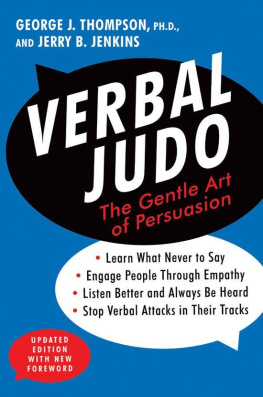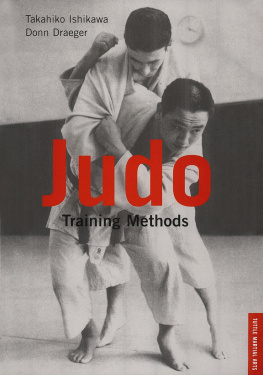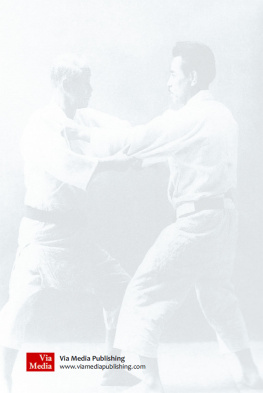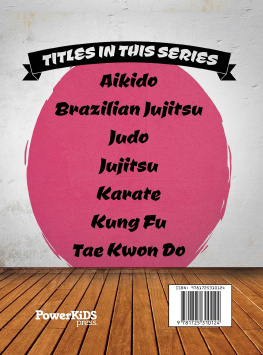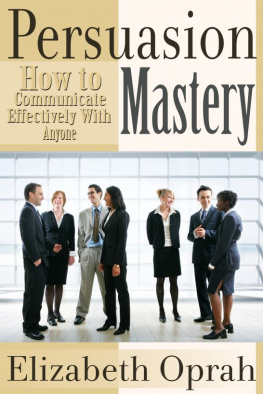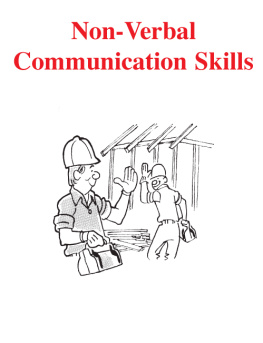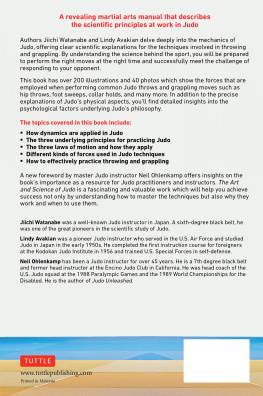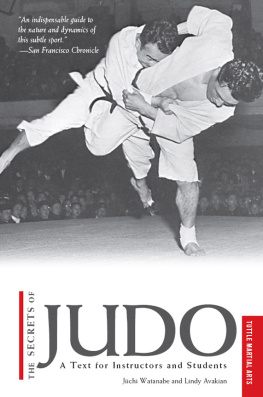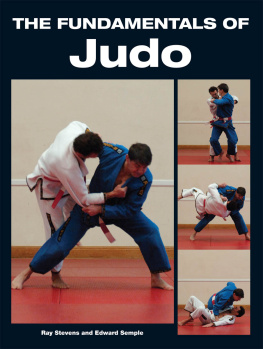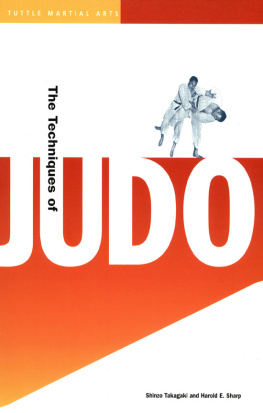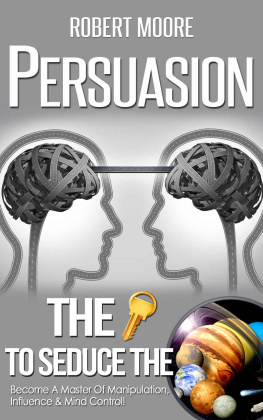To all who want to leave the lives of others better than they may have found them at their worst
With a heartfelt salute to the street cops of America who have shared their skills with me
And with thanks to my family, who might have wished I had been a quicker learner
Contents
by Lee Fjelstad and Pam Thompson
F OR THE LAST thirty years of his eclectic life, George J. Thompson III, aka Doc Rhino, crisscrossed America with a message the world desperately needs to heara message of tolerance for other human beings. This message begins with empathy, the touchstone for Georges Verbal Judo program. The new final chapter in this edition introduces George Thompsons Five Universal Truths of human interaction:
1. All people want to be treated with dignity and respect.
2. All people want to be asked rather than told to do something.
3. All people want to be informed as to why they are being asked or ordered to do something.
4. All people want to be given options rather than threats.
5. All people want a second chance when they make a mistake.
This global message promoting respect, understanding, and forgiveness can connect all people everywhere. But we need a vehicle to develop understanding, and using our words for a defined purpose can create the forward momentum.
Verbal Judo can help in every profession and can greatly enhance our personal lives. George Thompson shared a belief with the ancient Greeks: that action follows philosophy and that what we believe will dictate our actions in life. Thompson advocated that the more different we are from others, the more tactically we must speak in order to gain compliance, develop cooperation, or work in collaboration. Tactical civility better supports our actions and lessens resistance to new ideas or even change. By truly believing and advocating the philosophy of respect for others, we can maintain our tactical position even in adversarial situations, while allowing others to disagree and keep their dignity.
Verbal Judo strategies and tactics can help in so many ways to turn reactionary situations into winning situations. History classes are full of accounts of wars caused by the desire for land and resources, but many times these wars have been fought over simple disrespect. With anger becoming a new type of danger, the ability to speak calmly and persuasively has never been more necessary than now. The digital age has fundamentally changed how we must conduct our affairs in both professional and personal interactions. Our words are now carried to the masses, and our mistakes and errors in judgment are public and recorded, if we say things well later regret.
The philosophical foundation of Verbal Judo promotes using language to achieve a professional purpose and to do so with real power and empathy. We build a bridge that will promote dignity and respect. Recognizing the need for respect and the preservation of dignity of others are crucial, in every personal and professional encounter from police toward law-breakers, business competitor toward competitor, parents toward children, student toward teacher, doctor toward patient, and vice versa. George Thompson never wanted people to confuse sympathy with empathy ; we can feel the pain of others by merely asking ourselves how we would feel under identical circumstances. Verbal Judo does not require turning the other cheek or the use of touchy-feely language, and does not push political correctness; we must communicate our purpose, but we are not required to respect wrongful actions.
In law-enforcement classes Thompson was quick to state that those in the profession of bringing order from chaos cannot possibly be expected to respect the actions of hardened criminals against hapless victims. We must, however, respect their individual or collective constitutional rights; we must ensure the proper course into the courtroom and not compromise subsequent convictions with any action that undermines our professional goal. To quote a police officer from North Dakota, We treat people as ladies and gentlemen, not because they are, but because we are. What separates professionalism from amateur behavior is giving our opponent no solid grounds to make a stand against us, with our comments or actions.
A scholar turned police officer turned police trainer, George Thompson created Verbal Judo and was president of the Verbal Judo Institute, Inc., which he founded in 1984, for over thirty years. Doc trained his first associate in 1985, followed by many othersall dedicated to teaching his principles with the same enthusiasm and commitment to changing how we view conflict and resolution. Institute clients expanded quickly beyond the arena of law enforcement into corporations and business, the airline and cruise industries, the medical profession, and the field of education, and have become hugely popular with government employees in city, county, and federal offices. Operations were developed and expanded outside North America with offices in Australia, Africa, and Scandinavia, and the books have been published in several languages, making the reach of Verbal Judo global. Since 1984 over one million people have sat in Verbal Judo classes, and hundreds of thousands more have read the books, watched the videos, and listened to the audio versions of the principles and tactics of Verbal Judo.
The life work of George Thompson has become a force of its own through Verbal Judo and the Verbal Judo Institute, Inc. Imbued with his spirit, the program will continue to spread and envelop the world, one person, one profession, one nation at a time, until his vision is complete. The Institute will continue to promote new writings, new video and audio works, and new programs to meet the demands of a world that seems sometimes on fire. We at the Verbal Judo Institute, Inc., and our Verbal Judo family thank all our clients who have supported us over the decades. We will be here always with the message George wanted us to carry into the future.
We thank all of you for your continued support of Verbal Judo, with Pam Thompson now the CEO, and your continued vigilance in helping us protect Dr. Thompsons legacy. The sad passing of Dr. George J. Thompson III has left a hole in our hearts, but his program and ideals will move forward.
We promise.
Lee Fjelstad and Pam Thompson
And the rest of our family in the United States: Mike Manley, Doug Haig, Steve Wopershall; William King in Australia; Darcy Pennock in Canada; Bo Munthe in Sweden; and Don Gold in Africa.
Please visit the Verbal Judo websites: verbaljudoglobal.com and verbaljudoinstituteinc.com.
T HIS LITTLE VOLUME you are holding in your hands, Verbal Judo: The Gentle Art of Persuasion , battled to survive when it was first launched into the crowded book marketplace in 1993. But little by little, readers began to embrace its hope-filled message of better relationships and better communication through empathy. Our seminars and training sessions began to swell with more and more enthusiastic participants and word spread that this Verbal Judo stuff really works!
We know of the books impact from the hundreds of letters and e-mails we have received over the past decade. We know of its power from the many testimonials from our seminar participants, many of whom have come to the course more than once. As one put it last year, You know, Doc, Verbal Judo changed my life, but I need to hear its gospel every two years or so. Another wrote me, shortly after attending a training session, Thanks for saving my relationship with my teenage son. When I got home, I sat down and talked to my son, really for the first time in years. Verbal Judo turned me around. Thank you! And then there was the police officer who attended my five-day instructor course. On day one, a Monday, he informed me, Im getting a divorce next week. By Thursday night he called me at my hotel to tell me, You know, Doc, this course has hit home. I called my wife just now and told her we are putting off the divorce and heading to counseling, something she had wanted and I hadnt. I have learned Im the problem, and I value my wife and kids and intend to make the necessary changes. A year later I got a Christmas card from him and his wifehappily together!

